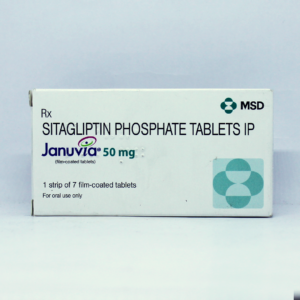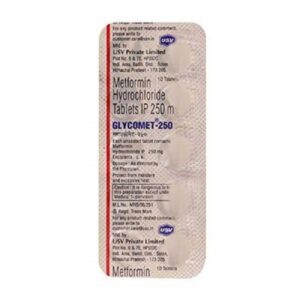Sicriptin 2.5
Sicriptin 2.5 is a member of a class of medications known as ergot derivatives that is used to treat a brain disorder known as Parkinson’s disease. Sicriptin 2.5 aids in the cessation of breast milk production shortly after stillbirth, abortion, miscarriage, or even after delivery if you decide not to continue breastfeeding your baby. Additionally, sicriptin 2.5 can be used in combination with other medications to treat acromegaly, type 2 diabetes, and Parkinson’s disease.
Bromocriptine is a component of Sicriptin 2.5 that boosts the brain chemical dopamine while decreasing the amount of prolactin produced. Additionally, it lowers the body’s production of growth hormone, which is used to treat acromegaly (increased growth hormone levels). Additionally, it improves insulin resistance, blood sugar control in type 2 diabetes mellitus, and dopamine levels, hence preventing Parkinson’s disease.
To avoid nausea and vomiting, use Sicriptin 2.5 with food or immediately after a meal. Take Sicriptin 2.5 in the dosage and period recommended by your physician. Never encourage self-medication or propose that someone else take your medicines. As with any medication, Sicriptin 2.5 may have adverse effects, though not everyone experiences them. In some situations, you may develop headaches, dizziness, tiredness, nausea, constipation, and a clogged nose. The majority of these Sicriptin 2.5 side effects are transient, do not require medical treatment, and resolve gradually over time. However, if the adverse effects persist, consult your physician.
Sicriptin 2.5 is contraindicated in patients with uncontrolled hypertension, known hypersensitivity to dopamine derivatives, or cardiac disease. Inform your physician if you are pregnant, planning to become pregnant, breastfeeding, or have kidney or liver disease. Children under the age of 16 years should not be given Sicriptin 2.5. Additionally, consider alternative methods of contraception if the hormonal circumstances are insufficient. While taking Sicriptin 2.5, it is necessary to monitor your blood pressure on a regular basis.
Sicriptin 2.5 Indications Parkinson’s disease, hyperprolactinemia, acromegaly, and type 2 diabetes

Medicinal Advantages
Sicriptin 2.5 contains Bromocriptine, which decreases the level of prolactin in your blood and so alleviates the symptoms you are experiencing. It works by raising the quantity of dopamine in the brain, hence decreasing the amount of prolactin released. Additionally, it lowers the body’s production of growth hormone, which is used to treat acromegaly (increased growth hormone levels). Additionally, Sicriptin 2.5 may be used to treat additional disorders associated with hormonal disturbance, resulting in increased prolactin production. This includes menstrual irregularities, infrequent and very light menstruation, periods without ovulation, and, in the absence of breastfeeding, milk secretion from the breast, even in men and women with high prolactin levels caused by unknown causes (idiopathic hyperprolactinemia) or pituitary gland tumors. It is also used to treat Parkinson’s disease by raising dopamine levels and controlling blood sugar levels in persons with type 2 diabetes through diet and exercise, and occasionally in combination with other drugs.
Use Instructions
To avoid nausea and vomiting, use Sicriptin 2.5 with food or immediately after a meal. Additionally, please take it at the dose and period prescribed by your physician.
Storage
Store in a cool, dry location away from direct sunlight.
Sicriptin 2.5 Adverse Reactions
Headache
Dizziness
Drowsiness
Fatigue
nauseous (feeling sick)
Vomited (being sick)
Constipation
Distressed stomach
Nose clogged
Adverse Drug Reactions
Bromocriptine should not be used if you are allergic to dopamine agonists or any of Bromocriptine’s components. It is recommended that you inform your doctor if you are pregnant or breastfeeding. Bromocriptine is not suggested for children under the age of 16 years. Bromocriptine is contraindicated if you have or have previously had uncontrolled hypertension or cardiac disease (such as congestive heart failure or myocardial infarction). Inform your doctor if you have sugar (glucose) and ketones (a type of chemical) in your urine, severe kidney or liver disease, a history of urinary tract infection, mental illness, low blood pressure, stomach or intestinal ulcers or bleeding, or Raynaud’s syndrome (a condition in which the hands and feet become numb and cool when exposed to cold temperatures). Regular blood pressure monitoring is essential when on Bromocriptine medication. Inform your doctor if you have galactose intolerance, Lapp lactase deficiency, or glucose-galactose malabsorption. When you rise abruptly from a supine posture, it may result in symptomatic hypotension (dizziness, nausea, sweating, and fainting). This is more likely to occur when you begin taking Bromocriptine or when the dose is raised. To avoid this issue, slowly rise from your bed, resting your feet on the floor for a few moments before standing.
Interactions Between Drugs
Bromocriptine interacts with other dopamine agonists (cabergoline, levodopa, pergolide, ropinirole), ergot-type medications (dihydroergotamine, ergoloid mesylates, ergonovine, ergotamine, methylergonovine, methysergide), antidiabetic medications (glimepiride, glipizide), diuretics (f (itraconazole, ketoconazole).
Bromocriptine may interact with table sugar, causing abdominal discomfort and stomach upset. As a result, sugary foods should be avoided. Bromocriptine also interacts with St. John’s wort (a herbal medicine to treat depression).
Drug-Disease Interactions: Individuals who have heart diseases (such as congestive heart failure and myocardial infarction), have sugar (glucose) and ketones (a type of chemical) in their urine, or who have severe kidney or liver disease frequently develop urinary tract infections, mental illness, low blood pressure, ulcers or bleeding in the stomach or intestines, Raynaud’s syndrome (a condition in which the hands and feet become numb and cool when exposed to
Safety Recommendations
ALCOHOL
Bromocriptine is a well-documented side effect of dizziness. As a result, alcohol should not be consumed concurrently with Bromocriptine.
PREGNANCY
Bromocriptine is a Category B pregnancy medicine that should be used during pregnancy only if the benefits outweigh the dangers. It is not suggested, however, in pregnant women with high blood pressure due to the risk of complications.
BREAST FEEDING
Because bromocriptine prevents you from making milk for your baby, you should avoid taking it if you intend to breastfeed.
DRIVING
Bromocriptine is a well-documented side effect of dizziness. As a result, driving or operating any type of machinery that demands focus should be avoided.
LIVER
Bromocriptine should be used cautiously, even more so if you have a family history of liver disease/conditions. Your doctor may need to alter the dose.
KIDNEY
Bromocriptine should be used cautiously, even more so if you have a family history of kidney disease/conditions. Your doctor may need to alter the dose.
Habit Formation : No
Advice on Diet and Lifestyle
Avoid alcoholic beverages while taking Bromocriptine since they may cause dizziness and dehydration and may impair your sleep.
Maintain a healthy blood sugar level, as it has been shown to decrease blood prolactin levels.
Quit smoking, as it increases heart rate and may exacerbate a cardiac condition.
Include foods and beverages high in omega 3 fatty acids in your daily diet. Additionally, you may substitute a low-fat cooking oil such as olive oil, soybean oil, canola oil, or coconut oil.
Consume a nutritious balanced diet rich in fluids, vegetables, proteins, and fat-free or low-fat dairy products. Additionally, it aids in weight loss and reduces the chance of heart attack.
Regular exercise keeps the mind alert and reduces stress, hence lowering prolactin levels.
Special Guidance
Regularly check your blood pressure, kidney, and liver function tests.
Every three months, you should get a glycated hemoglobin (HbA1C) test to monitor your blood glucose control.
Additional Information: This item is non-refundable.
Concern for Patients
Hyperprolactinemia is a condition in which a person’s blood has abnormally high quantities of the hormone prolactin. It results in infertility, diminished sexual drive, and bone deterioration. Additionally, women may experience vaginal dryness, which can result in pain during intercourse, menstrual issues, periods that are absent or irregular, and breast milk production when not pregnant or nursing. Erectile dysfunction—difficulty obtaining or maintaining an erection and Men may experience breast enlargement, as well as decreased muscle mass and body hair.
Acromegaly is a condition in which an excess of growth hormone is produced, resulting in excessive height or a huge face, hands, and feet.
Parkinson’s disease is a central nervous system ailment that impairs mobility owing to nerve cell death in the brain, lowering dopamine levels and resulting in symptoms such as stiffness, tremor in one hand, shaking, and difficulties walking, coordination, and balance.
Adult-onset diabetes mellitus 2: Adult-onset diabetes mellitus is a metabolic disorder characterized by elevated blood sugar levels. Type 2 diabetes occurs when insulin (a hormone produced by the pancreas’s beta cells) is ineffective in breaking down glucose into energy (insulin resistance), or when the pancreas (an organ beneath the stomach) produces insufficient or no insulin at all. This condition is more prevalent in persons over the age of 40, but it can also occur in children, depending on the risk factors.
FAQs
Sicriptin 2.5 is comprised of Bromocriptine is a dopamine receptor agonist that works by raising the brain chemical dopamine, which reduces the amount of prolactin released and also decreases the amount of growth hormone released. Additionally, it decreases insulin resistance and is used to treat type 2 diabetes.
Bromocriptine is not recommended if you are sugar sensitive, as it includes sugar and may cause unpleasant side effects. Consult your physician before to taking Bromocriptine and follow all directions exactly.
Bromocriptine is contraindicated in children younger than the age of 16 years. Its safety and efficacy in youngsters are unknown.
Bromocriptine should not be taken on an empty stomach due to the possibility of nausea and vomiting. Therefore, to avoid these adverse effects, take it with meals or shortly after eating.
Bromocriptine is reserved for the treatment of type 2 diabetes, also known as non-insulin-dependent diabetes.
Bromocriptine may be prescribed alone or in combination with other drugs to help control your blood sugar levels. However, it is important to maintain a healthy diet and physical activity to help regulate blood sugar levels while taking Bromocriptine alone or in combination with other antidiabetic medications.
Bromocriptine is not a cure-all medication for Parkinson’s disease. Bromocriptine is only used to treat Parkinson’s disease symptoms.
The danger of side effects is increased in elderly people who are taking Bromocriptine. For older people, dose adjustment may be necessary, or your doctor may prescribe another drug that is safe for the elderly.








Leave a Reply
You must be logged in to post a comment.